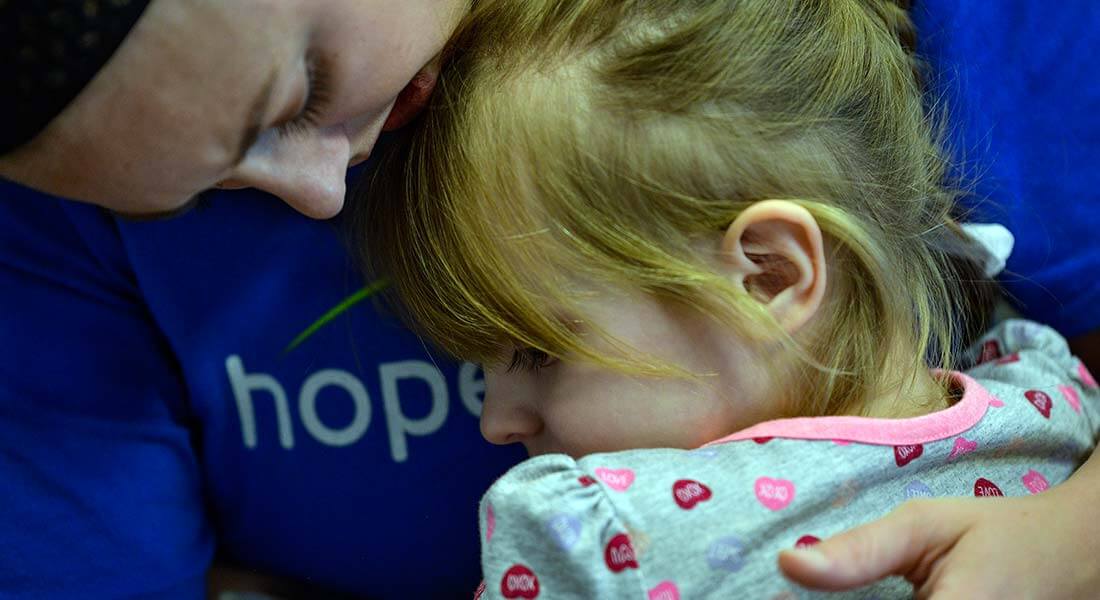Tips for Adjusting to the Time Change for Autism Families
October 22, 2021
October 22, 2021

Daylight Savings Time ends early November each year. Our children – and especially our kiddos with autism – don’t seem to grasp the amazing wonder that comes with a free hour of sleep. Daylight Savings Time is a tough concept for anyone to understand, not to mention these little learners are still developing routine sleep patterns and may be unable to self-regulate. For them, it feels like any other day and that early sunrise just means an extra hour of play.
But it’s not all fun and games. “Why do I have to stay in bed when the sun is up?” “Why is it dark while I’m eating dinner?” “Why can’t I play outside longer?” The shorter days of fall and winter can be confusing and affect more than their sleep; impacting emotions, appetite and behavior.
What is a parent to do? At Hopebridge, we put together a quick list of tips to make mornings (and evenings, too!) a little easier as we prepare to “fall back” on Sunday. These are especially helpful for children on the spectrum, but are also beneficial for neurotypical kids.
Talk to your children about the time change in advance.
This is pretty much the first step for all of our ‘tip sheets,’ but with good reason. Discussing what’s going to happen with your children limits surprises and better prepares them. Tell them you are setting back the clock and as a result, it will be light earlier in the morning when they might still be in bed. Inform them it will also get darker earlier at night. It’s best if you can pinpoint what they might regularly be doing at these times. Make sure to inform them when they might first notice these changes. Also tell them what you’d like them to do in these cases, such as continue to stay in bed and rest even though the sun is coming up. You can also ask your child’s therapist to assist in this process.

Maintaining regular chores and schedules is helpful in making the time change transition smooth
Make small changes in bedtimes (and wake-up times) before the ‘big day.’
Focus on small updates. Depending on when you start, shift bedtime and wake-up time by 5- to 15-minute increments, resulting in the full hour difference by Sunday. You can also spread out the adjustments even after Sunday if you’re a bit late to the game; just change the times accordingly. This makes the sleep-related time change much less noticeable on the body.
Keep kiddos busy.
We can help with this one during the week if your kid attends Hopebridge, but keep your child active on the weekend. Research shows exercise can help individuals adjust to new sleep schedules.
Keep the bedtime routine the same.
With the change in time, your child may be tired at what seems like earlier or later. As a result, it is easy to rush through the bedtime routine or start it earlier or later. Instead, we urge you to keep the schedule consistent in order to maintain the structure and provide security.
Consider a special clock.
In general, kids may not understand how to tell time or know the right hour to start their days. Some children with autism may even wake in the middle of the night ready to play, but visual aids can help. Special clocks like the OK to Wake Clock have a soft nightlight that turns green when it’s time to wake up, which helps set boundaries. While it’s not a great idea to begin a new routine of using this clock on the same night as the time change, if you have time, consider working it into your normal routine in an effort to ease the transition when the time is right.
Understand it may take children with ASD a bit longer to adjust.
Unfortunately, you can try all of these tips, and in the end, it could still take days, weeks, or – dare we say – months for children to adjust. Many of our kiddos live by their routines and habits, so an alteration could cause some anxiety. This will take patience, so give it time to mold.
Are we missing anything that has worked for you in the past or do you have any other concerns? Please share with us and other families on our Hopebridge Facebook page.
Do you need more support in this area or with other behaviors your child experiences (or doesn’t)? Our team of Hopebridge Heroes is here to serve as an extension of your family and give you – and your child – the tools needed for them to live more independently. Fill out the simple form on our “contact us” page and our team will work to get your child in for a diagnostic assessment for autism or ABA evaluation with as little wait time as possible.